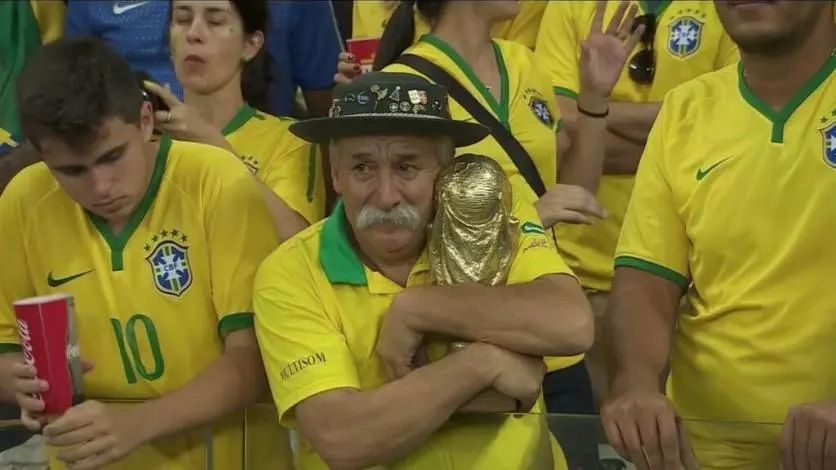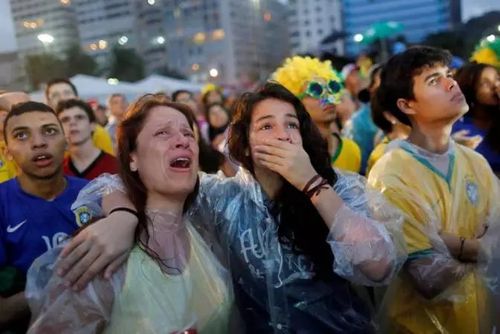
Brazil's loss at the World Cup: Crying for a False Tragedy

A Greek tragedy is a fatal flaw in a great character; Brazil had a fatal flaw but they were mistakenly seen as a great character. Filippo Inzaghi wrote in his coaching thesis he cried when he won, but never when he lost. This aphorism is essentially my position on the issue of the reaction to Brazil's loss to Germany.
Supporting a team can become a bit like alcohol: control the relationship well and it can be your servant, but there is always a danger that it can become your master. That was in evidence in the first half where yellow clad supporters began to weep, which, by definition, is uncontrollable. The electricity had struck some supporters on the rods of their backs. Images such as the one of the elderly gentleman who was snapped hugging his replica of the trophy wearing a puppy dog expression garnered a response of universal sympathy. Oh, I feel so sorry for him!
Once again, the speed of global information transfer has taken made fewer images take on as representative of the the rest of the story. Sure, when thought about in a calm state of mind, it is self evident that there were many more people in that stadium that did not resort to weeping than people who did. The problem with this type of fast spreading information (mainly through photographs) is that it can quickly drown out any thoughtful and slow thinking process which could lead an average person to believe that the nation is living and breathing and reacting as a whole, as if it were one entity, instead of the diversity of such.
Again, simplifying something, in this case a country and person, and personifying it as to represent a single person, a single opinion is much easier to create, package and distribute as a definitive report of opinion. No, it's not a national humiliation. No, it does not mean the nation is in mourning. No, I do not feel sorry for the "heartbroken" elderly gentleman.
The act of some players sending prayers into the air asking for forgiveness was creepy, and if it was a prayer for "strength" at a time of extreme sadness (keeping in mind the reason for this sadness) it would be a bit less creepy, but decidedly more solipsistic. The belief that god would (assuming that he can) listen to your grievances and would reply "there, there, cheer up" is a bit too much; it really is saying to the public that one is in need of a refreshing slap across the cheek, which can surely be no worse than conjuring imaginary voices inside one's head.
It could well be that the players have simply and innocently overestimated their duty to their nation. Sure, lay blame to the media and the public, but do not disproportion blame to the players. Part of being famous is the necessary knowledge of knowing when one does not need to submit themselves for the, as it were, "public stoning" that, for a certainty, cannot be justified. In an eerie sort of way, the public begging for forgiveness and mercy and sympathy by the players resembles the cries of the man that bears the identity of the nation's statue.
I will gladly grant that to give some kind of joy to the people of your country may be a relatively harmless or even charitable act. The socialism of joy as I call it: to create, package and distribute joy as a commodity. But the team was treated as a narcotic and people were unhappy that it was taken away from them with such ruthlessness and suddenness. The players were condemned as the ones responsible for the prohibition, and they fell for accusation. They were asked to immolate themselves, and they did.
As a digression, Luis Suarez has suffered a greater punishment than what the Brazilians have, partly because he has had to take on the totality of condemnation as opposed to the Brazilian players who had others to help carry their fair portion, and partly because it is much easier to identify the villain as a single person rather than a collective. Suarez may not have resisted, but that just might be because he knows that he is only hated by people who would not lose any benefit from doing so. Barcelona, on the other hand, would.
O Joga rated the performances of every player and the coach to be zero - that is, not so good. It is impossible not to notice an air of self righteous indignation, as if they had they were personally entitled and therefore correct to demand apologies. Somehow, if someone were brought to justice it would constitute some form of partial justice - better than nothing. Remember, this is not a governmental agency, the football association does not legally or constitutionally represent the people of Brazil, the representation is voluntary.

The team does not have the same mandate of responsibility to serve the public, it does not have a constitution to its people, only to FIFA. To that extent, the outcry against the team is simply a manifestation of embarrassment, which was self inflicted. As I have said in a previous article, it touches on a fake chauvinism based on the success of the nation's football team. Do they really care that a football team can affect the national image? Perhaps they could take an opinion poll asking for the rest of the world's "approval rating". (Ironically, international football seems to be one of only a few aspects of society that has so far resisted the homogenising pull of globalisation.)
I sometimes wonder whether the national team is more scrutinised by the public because it simply easier to do so. One does not need any knowledge of economics, law. Even the philosophy is restricted to a narrow range, There are less components, less people involved and certainly more restrictions. The mind is restricted to making judgements of the size of the field, which is generic, unlike the environment that makes the nation of Brazil. In other words, it is easier to have an opinion, but it is also because, I suspect, they know deep down their opinion won't mean much.
Brazil, get over it.